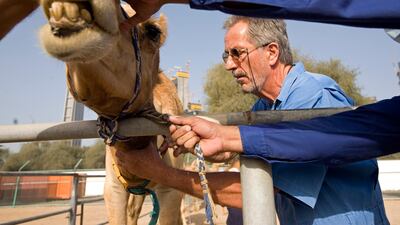The trial of a vaccine for Middle East Respiratory Syndrome in camels has been postponed because of Covid-19.
The work by the Central Veterinary Research Laboratory (CVRL) in Dubai was due to start last month but is now expected to begin next year.
Mers, also known as camel flu, is a strain of coronavirus that has killed more than 800 people since first emerging in 2012.
It is a viral respiratory disease, thought to originate in bats, that can infect humans and camels.
Dr Ulrich Wernery, the CVRL's scientific director, said he was disappointed that the programme was being delayed, but that protecting the health of researchers came first.
“The vaccine is ready but we have to wait for the field trials after this Covid-19 is over,” he said.
“Our health is more important. We can do it the same time next year.”
The new Mers camel vaccine has been developed by researchers at the Ludwig Maximilian University of Munich in Germany and colleagues in the Netherlands.
Scientists started by taking an existing vaccine against camelpox, another viral disease, and using genetic engineering to introduce protein parts of Mers particles.
Preliminary trials have indicated that when the vaccine is injected into camels, the animals begin producing antibodies that recognise and neutralise the Mers particles.
Newly born camels are typically immune to Mers because they obtain antibodies from their mothers’ milk.
But calves that are aged between three to five months have been known to become infected following the disappearance of these antibodies from their blood.
As a result, some calves can develop a runny nose or other mild clinical signs of illness and can pass the virus on to people.
The timeline of transmission has led to experts suggesting calves should be vaccinated prior to the antibodies disappearing, ensuring the animals are both immune to Mers and not infectious.
The UAE trials were due to be carried out at a secure desert location to prevent any risk to the public.
Researchers hope they will begin early next year when new born calves are at the right age.
If successful, Dr Wernery said the vaccine could be available immediately. He also pointed out that farmers were more likely to pay for the vaccine because it also ensured immunity from camelpox, a much more serious disease in camels than Mers.
“This will be a very, very big advantage,” he said. “Very soon, hopefully, we can eradicate Mers from camels.”
Although Mers does not spread easily person to person, it has proved extremely dangerous.
The risk to humans is largely because the cell receptor the virus attaches to, known as DPP4, is found deep in human lung tissue.
This can result in infected individuals developing deadly pneumonia.
Mers is known to have killed about one in three of the more than 2,500 cases in humans worldwide.
Saudi Arabia has proved hardest hit while the UAE has recorded 10 deaths.



